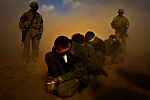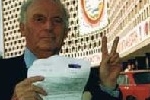 Shadows off the beaten path
Shadows off the beaten pathTAXI TO THE DARK SIDE | TOVARISCH, I AM NOT DEAD
< < D O C S > >
last update 28.Apr.08
See also: SHADOWS FILM FESTIVAL
 R E V I E W B Y R I C H C L I N E
R E V I E W B Y R I C H C L I N E
scr Jon Savage
with Bernard Sumner, Peter Hook, Stephen Morris, Tony Wilson, Annik Honore, Anton Corbijn, Pete Shelley, Terry Mason, Richard Searling, Lindsay Reade, Peter Saville, Genesis P Orridge
 release UK 2.May.08
release UK 2.May.0807/UK Works 1h33
TORONTO FILM FEST
See also:
CONTROL (2007)
 Like a companion piece to Control, this lucid, meticulous documentary chronicles one of the most influential bands to emerge from the Manchester music scene.
Like a companion piece to Control, this lucid, meticulous documentary chronicles one of the most influential bands to emerge from the Manchester music scene.
Told as the story of a city, the film looks at Manchester in the 1970s, a grimy and dirty place where the industrial revolution has given way to urban blight and personal hopelessness. It's no wonder that the Sex Pistols emerged from this place, and that in 1976 they inspired four young men (Sumner, Hook, Morris and Ian Curtis) to say, "I could do that," and form their own band, taking their name from Nazi propaganda. But after some early wannabe punk songs, they turned into something much more interesting, adding a personal, emotive expression that broke new ground.
Filmmaker Gee assembles this fluidly, telling the story in sequence with artful editing that draws on the musical themes. While his "story of a city" angle is a bit strained and pretentious, the film includes a fascinating array of carefully captioned archive footage, from scratchy scenes of early performances to intimate glimpses backstage. And then there's the terrific interview material, including a rare appearance by Curtis' lover Honore and extensive commentary from music guru Wilson before his untimely death last year.
And of course the music is vital as well, including rare recordings, bootleg sessions and aborted tracks. The film vividly traces the band's evolution over its short lifespan, while interviews with Sumner, Hook, Morris and others (including on-screen captions from Curtis' wife Deborah) add key facts and telling observations. The film cleverly parallels Curtis' increasingly introspective lyrics, with references to the likes of Kafka, Dostoyevsky and JG Ballard, as he and his bandmates struggled to cope with his sudden epilepsy. Not to mention the brutal irony of their biggest hit, Love Will Tear Us Apart.
This is a strong and lively film that really gets under the skin, edited with clarity to tell much more than the saga of an iconic rock group. At the end, it's the personal stories that linger in the mind, especially as the three surviving members rechristened themselves New Order on the Monday after Curtis' funeral and carried on with their musical innovation. But they've hardly ever played their old songs.
2.Apr.08
 R E V I E W B Y R I C H C L I N E
R E V I E W B Y R I C H C L I N E MUST
MUST  SEE
SEE
with Brent Pack, Janis Karpinski, Lynndie England, Sabrina Harman, Javal Davis, Megan Ambuhl Graner, Tim Dugan, Jeremy Sivitz, Tony Diaz, Roman Krol, Ken Davis, Jeffrey Frost

release US 25.Apr.08,
UK Jun.08
08/US Sony 1h58
BERLIN FILM FEST

 As opposed to the more politically angled Taxi to the Dark Side, Errol Morris investigates how something like Abu Ghraib could have happened on a human level. The result feels like a terrifying new genre: the horror doc.
As opposed to the more politically angled Taxi to the Dark Side, Errol Morris investigates how something like Abu Ghraib could have happened on a human level. The result feels like a terrifying new genre: the horror doc.
There's a clear sense that the powers that be are still deluded that torture is necessary to save lives. And it's this attitude that led America's forces into the abuse and ritual humiliation we saw in those chilling leaked photos. But the truth is that the guards pictured aren't the only ones to blame; their superiors created an environment in which torture was standard operating procedure. Although the word "torture" was carefully redefined to sooth their consciences. As if they have any.
Like in his brilliant The Fog of War, Morris lets the interviewees explain their own failings, often without realising it. His filmmaking is smooth and thorough, using Pack's painstaking investigation into the photographs to piece together the story. The images are truly shocking--physically, emotionally, morally--and listening to guards explain them is unnerving, mainly because they still don't grasp the bigger picture. It's impossible to accept their protestations ("I'm a nice guy," insists Sivits, who went to jail after appearing in photos), even if the true villains are still at large, and in charge.
Yes, the problem that created this situation continues virtually unchanged. Morris outlines systematic torture that's hidden by bureaucratic semantics and flat-out lies (like cleaning everything up before the Red Cross comes to inspect), brazenly obscuring evidence and viciously shifting blame down to the lowest levels. The vile attitudes of the high command are just as shocking as the horrific photographs that pass across the screen.
Essentially, Morris unveils the fact that American leaders are using fear to silence the truth while they continue to say that any torture methods are allowable in the so-called "War on Terror" as long as no one finds out about them. What these people are justifying is sadistic, unthinkable evil, whether or not it's in the name of making the world as safer place. "When you're in war, things change," insists one perpetrator, but we don't buy it. And we know that, on the contrary, this kind of behaviour only makes the world much more dangerous.
28.Mar.08
 R E V I E W B Y R I C H C L I N E
R E V I E W B Y R I C H C L I N E MUST
MUST  SEE
SEE
with Moazzam Begg, Carlotta Gall, Frank B Gibney, Tim Golden, Scott Horton, Carl Levin, John McCain, Alfred W McCoy, Alberto Mora, Lawrence Wilkerson, Tom Wilner, John Yoo
 release US 18.Jan.08,
release US 18.Jan.08, UK 30.May.08
07/US Discovery 1h46
See also:
EXCLUSIVE INTERVIEW WITH ALEX GIBNEY
 This Oscar-winning documentary takes a lucid approach to a horrific situation. The sober tone and meticulous attention to detail make it clear that something has come dangerously undone in the world right now. It's hard to imagine a more urgent and essential film this year.
This Oscar-winning documentary takes a lucid approach to a horrific situation. The sober tone and meticulous attention to detail make it clear that something has come dangerously undone in the world right now. It's hard to imagine a more urgent and essential film this year.
The film is framed by the story of Dilawar, a young Afghan taxi driver who picked up three passengers in December 2002 and never returned home. Five days later he was dead, murdered by American soldiers while detailed at Bagram. He was a complete innocent, the wrong man in the wrong place; his passengers, also innocent, were sent to Guantanemo for two years of similar treatment before the international community forced their release. The truth is that, despite claims by Bush, Cheney and Rumsfeld that detainees in Bagram, Abu Ghraib and Guantanemo are "the worst of the worst" who don't deserve protection from torture, 93 percent of them were picked up by local militias and traded to the Americans for cold, hard cash.
The sheer horror on display goes against every value a so-called Christian nation should hold. Regardless of the situation, this kind of treatment is reprehensible, and most of the information gleaned through these tactics has turned out to be false, desperate statements given by men in excruciating pain who thought they were going to die. This includes the information that led to the invasion of Iraq. And it isn't surprising when you see the methodology: beatings, forced standing, sleep deprivation, nudity, sexual assaults, enemas, simulated homosexuality, extreme temperatures, threatened electrocution, dog attacks and forced hydration with the threat of death if they urinate. Plus, of course, waterboarding. All of this was authorised by Bush, Cheney, Rumsfeld and other top leaders. And they have admitted it, insisting that it's not torture, because they have redefined the word "torture" to fit their purposes.
The most impressive thing about this film is its tone, which is measured and painstaking. There's no rush to assign blame, just a slow, steady examination following the raw evidence, from the bottom (the soldiers assigned blame as "a few bad apples") to the very top. There's not a moment of hysterical tub-thumping; the film is more like a lament for the state of the planet, simply revealing the truth through impeccably assembled archive footage, graphic photos and interviews with military officers, prison guards, interrogators, lawyers, senators, journalists, professors and even a few victims.
The filmmakers are also careful to put things into context, noting that some of these methods were used by the Spanish Inquisition and the Kmer Rouge, and talking to such veterans as McCain, who suffered six years of torture as a Vietnam prisoner of war, and Gibney, who interrogated prisoners in WWII and notes how, back then, America insisted on decency, fairness and the rule of law. It's also quietly noted that these values have now been thrown out by a president who says it's "unacceptable" that his soldiers are being held accountable for torturing "enemy combatants", even as he drafts legislation that makes it impossible for him to be held accountable. And worse yet: in a poll, 35 percent of Americans said they believe torture is acceptable in some circumstances.
The material here is almost overwhelming in its depiction of evil and injustice being perpetrated by a nation that prides itself in being the world's good guy. The even more horrifying truth is that we don't want to hear these things. We prefer to blindly go about our lives, re-electing and supporting leaders who are doing these things. This makes us complicit in their actions. And seriously stupid if we think there isn't some sort of payback coming.
1.Apr.08
 R E V I E W B Y R I C H C L I N E
R E V I E W B Y R I C H C L I N E
with Garri Urban, Stuart Urban, Noka Kapranova, Menachem Urban, Anne Applebaum, Josephine Urban, Mark Urban
 release US 30.Sep.07,
release US 30.Sep.07, UK 2.May.08
07/UK 1h23
RANDANCE FILM FEST
 Some 14 years in the making, this documentary is an attempt by the filmmaker to make sense of his larger-than-life father and his eponymous autobiography, which traces how he survived both the Holocaust and the gulag.
Some 14 years in the making, this documentary is an attempt by the filmmaker to make sense of his larger-than-life father and his eponymous autobiography, which traces how he survived both the Holocaust and the gulag.
Garri Urban was born in Poland and trained as a doctor. When the Nazis invaded, he attempted to escape into Romania, and after being shot uttered the title line (tovarisch means "comrade"). The Russians sent him to an Arctic labour camp, but he escaped to Moscow, then to Tashkent, where he became engaged to Noka. But he was arrested again and tortured, escaping this time into Kazakhstan. From here he travelled to Kiev, Germany, Belgium, Venezuela and eventually to England with his British wife Josephine. At least that's how he tells the story.
Stuart grew up with these stories from his father, who was always the life of the party. But the fall of the Soviet Union in 1991 gave Garri his first chance to return. So Stuart accompanies him with a camera as they travel from Moscow to Tashkent. But what they discover doesn't sit right with Stuart, and the film remains incomplete until Garri's death in 2004, after which Stuart tries to fill in the gaps by retracing the journey again.
The film is assembled from a wealth of photos and old footage that set the scene perfectly and paint a vivid portrait of Garri's adventurous, slightly mythical life. During the 1992 journey, we get a strong sense of his charismatic personality, including the feeling that he's haunted by his experiences, especially in the Tashkent prison (where he returns for his KGB file). And it's moving as he remembers firsthand the atrocities of Hitler and Stalin.
But the film never quite resolves itself to the continuing mystery. There's clearly a bigger picture that we're not seeing, mainly because no one knows the full truth. And there are also some major gaps in the story itself, plus Stuart's dull and perfunctory voiceover, which is read in a "what I did last summer" sort of way and grounds the terrific images and epic tale in mundane realism. But as the story of a man with a fierce survival instinct and an outrageous sense of invention, it's absolutely fascinating.
1.Apr.08


See also: SHADOWS FILM FESTIVAL
© 2008 by Rich Cline, Shadows
on the Wall